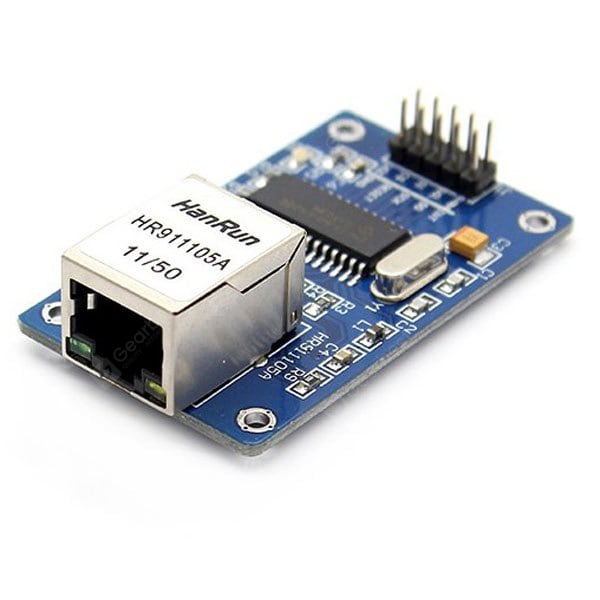Mbed library for ENC28J60 Ethernet modules. Full support for TCP/IP and UDP Server, Client and HTTP server (webserver). DHCP and DNS is included.
Dependents: mBuino_ENC28_MQTT Nucleo_Web_ENC28J60 Nucleo_Web_ENC28J60_ADC Serial_over_Ethernet ... more
Library for ENC28J60 Ethernet modules.

Ported to mbed from Norbert Truchsess's UIPEthernet library for Arduino. Thank you Norbert!
- Full support for persistent (streaming) TCP/IP and UDP connections Client and Server each, ARP, ICMP, DHCP and DNS.
- Works with both Mbed OS 2 and Mbed OS 5.
Usage:
- Import the library into your project.
- Add
#include "UipEthernet.h"tomain.cpp - Create one instance of the UipEthernet class initialized with the MAC address you'd like to use and SPI pins of the connected Mbed board.
Example programs:
Import programWebSwitch_ENC28J60
HTTP Server serving a simple webpage which enables to remotely turn a digital output on/off. Compile, download, run and type 'IP_address/secret/' (don't forget the last '/') into your web browser and hit ENTER.
Import programHTTPServer_Echo_ENC28J60
A simple HTTP server echoing received requests. Ethernet connection is over an ENC28J60 board. Usage: Type the server's IP address into you web browser and hit <ENTER>.
Import programTcpServer_ENC28J60
Simple TCP/IP Server using the UIPEthernet library for ENC28J60 Ethernet boards.
Import programTcpClient_ENC28J60
Simple TCP/IP Client using the UIPEthernet library for ENC28J60 Ethernet boards.
Import programUdpServer_ENC28J60
Simple UDP Server using the UIPEthernet library for ENC28J60 Ethernet boards.
Import programUdpClient_ENC28J60
Simple UDP Client using the UIPEthernet library for ENC28J60 Ethernet boards.
Import programMQTT_Hello_ENC28J60
MQTT Client example program. Ethernet connection is via an ENC28J60 module.
utility/ip6tos.c
- Committer:
- hudakz
- Date:
- 2019-09-07
- Revision:
- 15:53715cc81c63
- Parent:
- 14:7648334eb41b
File content as of revision 15:53715cc81c63:
/*
* Copyright (c) 2014-2015 ARM Limited. All rights reserved.
* SPDX-License-Identifier: Apache-2.0
* Licensed under the Apache License, Version 2.0 (the License); you may
* not use this file except in compliance with the License.
* You may obtain a copy of the License at
*
* http://www.apache.org/licenses/LICENSE-2.0
*
* Unless required by applicable law or agreed to in writing, software
* distributed under the License is distributed on an AS IS BASIS, WITHOUT
* WARRANTIES OR CONDITIONS OF ANY KIND, either express or implied.
* See the License for the specific language governing permissions and
* limitations under the License.
*/
#include "mbed_version.h"
#if MBED_MAJOR_VERSION == 2
#include <stdio.h>
#include <string.h>
#include "common_functions.h"
#include "ip6string.h"
/**
* Print binary IPv6 address to a string.
* String must contain enough room for full address, 40 bytes exact.
* IPv4 tunneling addresses are not covered.
* \param addr IPv6 address.
* \p buffer to write string to.
*/
uint_fast8_t ip6tos(const void *ip6addr, char *p)
{
char *p_orig = p;
uint_fast8_t zero_start = 255, zero_len = 1;
const uint8_t *addr = ip6addr;
uint_fast16_t part;
/* Follow RFC 5952 - pre-scan for longest run of zeros */
for (uint_fast8_t n = 0; n < 8; n++) {
part = *addr++;
part = (part << 8) | *addr++;
if (part != 0) {
continue;
}
/* We're at the start of a run of zeros - scan to non-zero (or end) */
uint_fast8_t n0 = n;
for (n = n0 + 1; n < 8; n++) {
part = *addr++;
part = (part << 8) | *addr++;
if (part != 0) {
break;
}
}
/* Now n0->initial zero of run, n->after final zero in run. Is this the
* longest run yet? If equal, we stick with the previous one - RFC 5952
* S4.2.3. Note that zero_len being initialised to 1 stops us
* shortening a 1-part run (S4.2.2.)
*/
if (n - n0 > zero_len) {
zero_start = n0;
zero_len = n - n0;
}
/* Continue scan for initial zeros from part n+1 - we've already
* consumed part n, and know it's non-zero. */
}
/* Now go back and print, jumping over any zero run */
addr = ip6addr;
for (uint_fast8_t n = 0; n < 8;) {
if (n == zero_start) {
if (n == 0) {
*p++ = ':';
}
*p++ = ':';
addr += 2 * zero_len;
n += zero_len;
continue;
}
part = *addr++;
part = (part << 8) | *addr++;
n++;
p += sprintf(p, "%"PRIxFAST16, part);
/* One iteration writes "part:" rather than ":part", and has the
* explicit check for n == 8 below, to allow easy extension for
* IPv4-in-IPv6-type addresses ("xxxx::xxxx:a.b.c.d"): we'd just
* run the same loop for 6 parts, and output would then finish with the
* required : or ::, ready for "a.b.c.d" to be tacked on.
*/
if (n != 8) {
*p++ = ':';
}
}
*p = '\0';
// Return length of generated string, excluding the terminating null character
return p - p_orig;
}
uint_fast8_t ip6_prefix_tos(const void *prefix, uint_fast8_t prefix_len, char *p)
{
char *wptr = p;
uint8_t addr[16] = {0};
if (prefix_len > 128) {
return 0;
}
// Generate prefix part of the string
bitcopy(addr, prefix, prefix_len);
wptr += ip6tos(addr, wptr);
// Add the prefix length part of the string
wptr += sprintf(wptr, "/%"PRIuFAST8, prefix_len);
// Return total length of generated string
return wptr - p;
}
#endif
